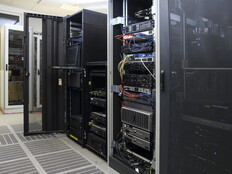4 Reasons Why Your Business Should Implement VDI
Virtual desktop infrastructure (VDI) sounds complicated and expensive because manufacturers often use the word "infrastructure" as code for complicated and expensive. In this case, however, the term just means a framework that may make computing easier and less expensive for your company.
The VDI label can be applied to everything from a remote terminal session to cloud-based apps running in a browser. For this discussion, VDI means the technology that separates application processing from the actual computer being touched by the user.
Big players that offer various VDI products include Microsoft (early Terminal Services led to Remote Desktop), VMware (View) and Citrix (XenDesktop). All have proved useful in four key areas.
1. VDI Means Better Support
Managing desktops scattered around an office or across the country can be difficult and time consuming. Putting applications inside the data center, running on servers inaccessible to the users, simplifies support. If a critical program needs to be updated, you can do it on one server rather than on all of your computers.
2. VDI Can Strengthen Security
Virtual application images inside the server room are far removed from the malware, often accidentally introduced by the user, that sticks to personal computers. And virtual images mean that if an instance does somehow get clobbered by an especially clever user, the old compromised image can be deleted, and a new, clean image can be started. For users and administrators, that’s far less hassle than cleaning an infected personal computer.
This added security must take into account the VDI philosophy for the company. Those running, say, a call center will have a locked-down, secure set of applications that can't be changed by users. Although replicating a secure application setup is possible on a PC, VDI makes this approach easier and faster. Companies that permit users to add applications and configure their desktops can allow such flexibility using VDI.
Another security bonus is that VDI sessions are remote, because the local computer connects to the server hosting the VDI software over the network. That network can be local if the VDI servers are in the same building, but they're often remote to a data center. Offices may be in dicey places, like hurricane areas, but data centers are built to keep functioning, no matter what.
3. VDI Makes Remote Connections Easier
I saw this in action with a company I consult with on occasion. They moved a Houston law firm to a VDI model.That law firm had a chance to buy a smaller law firm in Pennsylvania. Transitioning remote offices used to takes weeks, but with VDI, all the acquired lawyers were able to immediately start working with the services and applications used by the main office. The time and money saved was considerable, all because of VDI.
4. VDI Makes the BYOD Crowd Happy
VDI client software supports any computing device running most operating system (including Windows, Mac OS, and many versions of Linux), while making the same services and applications available to all. If there’s a need to support iPads, load the VDI client app and you're done. For the department that refuses to let you update their XP computers, load the VDI client and you are done. The department users still see the square Start button, but all of the applications can be Windows 7, or Windows 8 when ready.
VDI isn't for every small- to medium-sized business, but the trend is moving that way. If you think your business is too small, think again. Hosting providers can make VDI almost as simple as hosted e-mail servers. So if any of the aforementioned benefits sound enticing, check out VDI.








